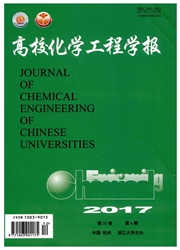

 中文摘要:
中文摘要:
首先制备了一系列的单元(CeO2,TiO2,ZrO2)、双元(Ce-Ti,Ti-Zr)和三元(Ce-Ti-Zr)载体,然后通过浸渍法在载体表面负载Co,考察了载体组成和焙烧温度对该催化剂的甲烷部分氧化(POM)催化性能的影响.利用N2物理吸附、X射线粉末衍射、H2-程序升温还原、扫描电子显微镜和热重分析等手段对反应前后催化剂的物理化学性质进行了表征.实验结果表明,载Co催化剂的催化性能按三元>双元>单元的顺序依次降低.700℃焙烧制备的Co/Ce-Ti-Zr-700三元载体催化剂表现出最高的CH4转化率和H2、CO的选择性,同时该催化剂具有较高的稳定性.在Ce-Ti-Zr三元载体催化剂中,CeO2-TiO2-ZrO2之间产生了较强的相互作用,从而抑制了非活性相CoTiO3的生成,产生了更多的活性中心;同时这种载体之间的作用可以防止催化剂在反应过程中发生相变生成CoZr2和ZrC之类的物质.
 英文摘要:
英文摘要:
A series of single (CeO2, TiO2, ZrO2), binary (Ce-Ti, Ti-Zr) and ternary (Ce-Ti-Zr) composite supports were synthetized to prepare cobalt containing catalysts for the partial oxidation of methane. The catalysts were then obtained by impregnation method using the as-synthesized supports. The effects of support composition and calcination temperature on the catalytic performance of the catalysts in partial oxidation of methane (POM) were investigated. The fresh and used catalysts were characterized by physicochemical characterization methods such as N2 physical adsorption, X-ray diffraction (XRD), H2-temperature programmed reduction (TPR), scanning electron microscopy (SEM) and therrnogravimetry (TG). Experimental results show that the performance of the cobalt-based catalysts decreases according to the following orders: ternary 〉 binary 〉 single. Co/Ce-Ti-Zr-700 catalyst calcined at 700℃ exhibites the highest CH4 conversion and selectivity to CO and H2, as well as the best stability. The strong interactions between CeO2, TiO2, and ZrO2 in the ternary support effectively restrain the formation of non-active phase of CoTiO3 and promote the formation of active sites. Furthermore, during the POM reaction, the interactions can inhibit the phase transformation of catalyst to generate the non-active phase of CoZr2 or ZrC.
 同期刊论文项目
同期刊论文项目
 同项目期刊论文
同项目期刊论文
 ~Phase transformation synthesis of novel Ag2O/Ag2CO3 heterostructures with high visible light effici
~Phase transformation synthesis of novel Ag2O/Ag2CO3 heterostructures with high visible light effici ~Hydrothermal synthesis and characterization of novel PbWO4microspheres with hierarchical nanostruct
~Hydrothermal synthesis and characterization of novel PbWO4microspheres with hierarchical nanostruct A sonochemical route to fabricate the novel porous F, Ce-codoped TiO2 photocatalyst with efficient p
A sonochemical route to fabricate the novel porous F, Ce-codoped TiO2 photocatalyst with efficient p Thermal stability, microstructure and photocatalytic activity of the bismuth oxybromide photocatalys
Thermal stability, microstructure and photocatalytic activity of the bismuth oxybromide photocatalys ~Stable Au25(SR)18/ TiO2 Composite Nanostructure with Enhanced Visible Light Photocatalytic Activity
~Stable Au25(SR)18/ TiO2 Composite Nanostructure with Enhanced Visible Light Photocatalytic Activity ~Novel hollow Pt-ZnO nanocomposite microspheres with hierarchical structure and enhanced photocataly
~Novel hollow Pt-ZnO nanocomposite microspheres with hierarchical structure and enhanced photocataly ~Novel noble metal (Rh, Pd, Pt)/BiOX(Cl, Br, I) composite photocatalysts with enhanced photocatalyti
~Novel noble metal (Rh, Pd, Pt)/BiOX(Cl, Br, I) composite photocatalysts with enhanced photocatalyti ~Synthesis and characterization of Ag/TiO2-B nanosquares with high photocatalytic activity under vis
~Synthesis and characterization of Ag/TiO2-B nanosquares with high photocatalytic activity under vis ~Preparation of Co/CexTi1-xO2 Catalysts and Their Catalytic Performance in the Catalytic Partial Oxi
~Preparation of Co/CexTi1-xO2 Catalysts and Their Catalytic Performance in the Catalytic Partial Oxi Fast fabricate Co3O4 or CuO/BiVO4 composite photocatalysts with high crystallinity and enhanced phot
Fast fabricate Co3O4 or CuO/BiVO4 composite photocatalysts with high crystallinity and enhanced phot An efficient palladium membrane reactor for increase the yield of styrene in ethylbenzene dehydrogen
An efficient palladium membrane reactor for increase the yield of styrene in ethylbenzene dehydrogen Preparation of bismuth oxyiodides and oxides and their photooxidation characteristic under visible/U
Preparation of bismuth oxyiodides and oxides and their photooxidation characteristic under visible/U 期刊信息
期刊信息
